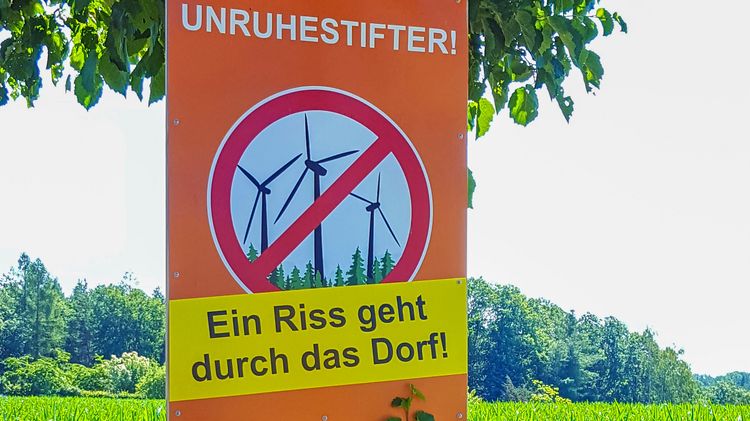Understanding the transition
Understanding the transition
Understanding the transition

Restructuring the energy system not only requires technical know-how, but also knowledge of the social processes supporting this change. Social scientist Jannika Mattes investigates how these unfold.
An idyllic country village: lonely country roads lined with gnarled trees, cornfields stretching all the way to the horizon, rare birds rendezvousing on the forest edge. Here, where there is so much space for nature and humans, a wind farm is to be built. But among the villagers, recent arrivals and long-time residents alike, a row breaks out: What about protecting the birds? Who benefits from the new wind turbines? And where should they be erected?
Wind energy is only the backdrop for Juli Zeh's socio-critical novel “Unterleuten". But the old and new disputes that flare up between the inhabitants of a fictitious village in Brandenburg illustrate how producing green electricity to support the “Energiewende” (energy transition) raises not just technical questions, but also human ones. “The energy transition is a social process," says Prof. Dr. Jannika Mattes. “And social processes are complicated.”
Mattes, a social scientist and Professor of Organisation and Innovation at the University of Oldenburg, knows what she's talking about. In the junior research group REENEA, which is funded by the German Research Foundation (DFG), she is studying the social background of the energy transition on the basis of regional case studies. Although the restructuring of Germany’s energy system is the subject of continual public debate, little is known about the role of the individual parties involved, she explains. And little is known about which factors advance or hinder it. Mattes and her team of three researchers aim to fill this knowledge gap.
Companies and investors feel abandoned
Mattes is focussing on the wind energy sector as a case study for her research. The German government wants 60 percent of the electricity consumed in Germany to come from renewable energy sources by 2030. Currently, wind power accounts for just under 18 percent of the country’s gross electricity consumption.
There are more than 29,000 land-based turbines in Germany, almost a third of which are in Lower Saxony, along with a growing number of offshore farms. But even though the proportion of wind power in Germany’s energy mix has grown steadily since 1987, when the first wind farm was built in Schleswig-Holstein, land-based expansion is now slowing down – for very diverse reasons.
One of them is that energy policy has changed significantly since the amendment of the Renewable Energy Sources Act (EEG). Among other things fixed subsidy rates were abolished, affecting remuneration for electricity fed into the grid. “This has upset many companies and left investors feeling abandoned,” says Mattes.
Massive problems with acceptance
Then there’s the fact that public opposition to green expansion measures is growing – for example when they interfere with nature conservation, or when citizens feel their own concerns are being ignored. “Most people accept that the green energy transition is necessary,” the social scientist stresses, “but they don’t want the expansion to take place on their own doorstep.”
Mattes experiences this first-hand in her research: she and her team are laboriously interviewing people who are directly affected by the restructuring of the energy system – from turbine manufacturers, service providers and planners to political decision-makers, conservationists and members of the general public. The researchers also comb through documents and attend public discussions. Yet the massive problems with acceptance are just one aspect they are encountering.
“We’re interested in the roles the affected parties see themselves in, the knowhow they can contribute, the factors that influence their decisions, and the power structures in place,” Mattes explains. To do full justice to the complexity of the issue, the individual case studies go deep.
The team has conducted more than thirty one-to-two-hour interviews based on a common interview guideline in the Oldenburg area alone. The researchers then evaluate the interviews and documents, assigning them to different categories in order to identify overarching themes and similarities as well as contradictions. “We’re conducting standard empirical social research,” says Mattes.
Providing subsidies on a random basis doesn’t work
Although not all the case studies have been completed yet – Mattes’ team is studying the energy transition in five other regions in addition to Oldenburg, including the Uckermark, North Frisia and Hamburg – she has already arrived at certain conclusions. The results show that the social dimensions of the energy transition vary from region to region and that requirements also vary.
In rural areas like the Uckermark in Brandenburg there is a complete lack of infrastructure, for instance institutions or formal networks that could support the transition and ultimately implement the necessary changes. In Oldenburg, by contrast, wind energy has high priority and numerous companies, most of them connected to the university, have been established over the years. Here, both official and personal networks facilitate dialogue among the various parties involved in the process.
For Mattes, these initial findings – as predictable as some of them may be – contain an “important message to policy-makers”: namely that providing subsidies on a random basis doesn’t work because it fails to address specific needs. She also draws another important conclusion: a region will be more receptive to the energy transition if the necessary processes have grown over time and the parties involved trust each other. “In such cases wind energy is not perceived as a burden but forms part of the self-image of a region that supplies itself and others with electricity,” says the social scientist.


